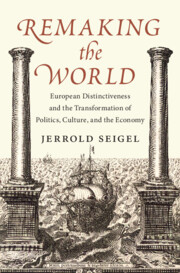 Remaking the World
Remaking the World from Part III - Openness and Domination
Published online by Cambridge University Press: 29 November 2024
Although Europe deserves condemnation for the ethnocentric and racist notions and attitudes that flourished within it both before and during the era of imperialism, these were preceded, accompanied, and countered by a singular interest in and openness to other peoples and cultures. The marks of this openness were an exceptional interest in travel and writings about it, in learning non-European languages and translating and circulating texts written in them, in correcting their own forbears’ calumnies and defamations of others by exposing myths and legends for what they were, and by acknowledging the historical and cultural achievements of other peoples. The notion that Asian governments were despotic spread chiefly because those who adopted it feared the spread of autocracy in their own countries, and it drew forth harsh criticism. Images of other countries or regions, especially China and the Near East, became mirrors in which Europeans contemplated the limitations and narrow prejudices of their own way of life.
To save this book to your Kindle, first ensure [email protected] is added to your Approved Personal Document E-mail List under your Personal Document Settings on the Manage Your Content and Devices page of your Amazon account. Then enter the ‘name’ part of your Kindle email address below. Find out more about saving to your Kindle.
Note you can select to save to either the @free.kindle.com or @kindle.com variations. ‘@free.kindle.com’ emails are free but can only be saved to your device when it is connected to wi-fi. ‘@kindle.com’ emails can be delivered even when you are not connected to wi-fi, but note that service fees apply.
Find out more about the Kindle Personal Document Service.
To save content items to your account, please confirm that you agree to abide by our usage policies. If this is the first time you use this feature, you will be asked to authorise Cambridge Core to connect with your account. Find out more about saving content to Dropbox.
To save content items to your account, please confirm that you agree to abide by our usage policies. If this is the first time you use this feature, you will be asked to authorise Cambridge Core to connect with your account. Find out more about saving content to Google Drive.